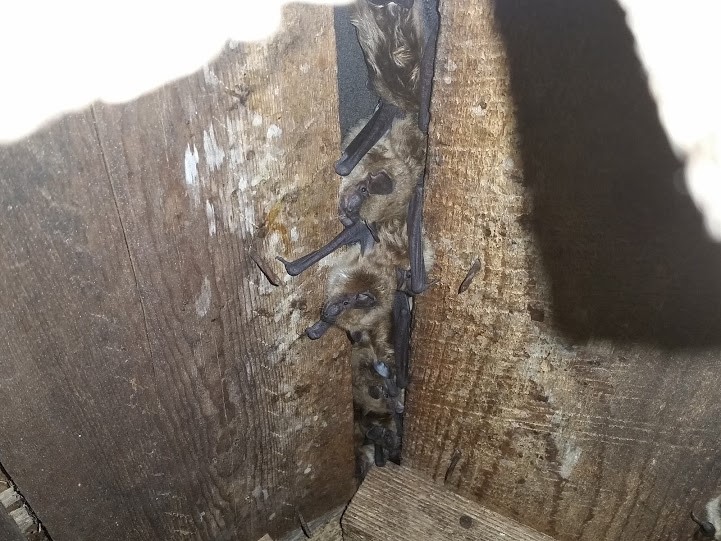Only if we could sleep through winter. That would be great. Miss the ice, cold and snow. No more driving in a winter storm. No more driveway shovelling. No more winter boots, coats and mitts. No more worries. Just a long nap until summer. Well, this may be one of the few times you’re jealous of bats. Some species will miss the cold during hibernation.
Not all bats hibernate
But, the ones that do usually pack it in when the weather is colder and flying insects start to become scarce. During hibernation they can be found cuddled up in small furry balls in caves, attics or walls. Tropical bats generally have enough food all year round that they will not hibernate.

Bats clustered together in an attic.
Bats in our cooler Ontario climate generally hibernate up to six months. They will survive in a deep sleep on only a few grams of stored fat. By dropping their body temperature and slowing metabolism they will be able to make it through the long slumber period. By spring they will have lost about half their body weight.
Some bats will hibernate in your attic
Small brown bats will generally find caves to hide-out in over winter. If you have spotted bats coming from your home in winter there’s probably a big brown bat colony in your attic. These are the only species of bats that hibernate in buildings.
Big brown bats often wake up during hibernation. Every couple weeks they will stretch their wings and move around. During their exercise they might accidentally fly out a small hole and into your home’s living space. Bats also wake up due to sudden temperature changes. Whether it’s warmer or colder than they’re used to, bats will awaken to find another place more suitable.
Signs bats are hibernating in your building
- Brown to black stains. As bats come and go oils from their fur stain an opening.
- Noise in your home. Scratching or rustling can be heard while bats move around.
- They’re segmented and full of insects.
- A bat sighting. Seeing them fly from your home at night.
Skedaddle Bat Removal
Bats can generate a lot of fear in people. They’ve been known to carry rabies and other diseases. When discovering evidence of a roost in your home be sure to leave bat colony removal to wildlife animal removal specialists. Disturbing a roost can distribute airborne bacteria and parasites.
Skedaddle Humane Wildlife Control will safely remove any bats, repair damage and decontaminate areas.
Call today! 1-888-592-0387


